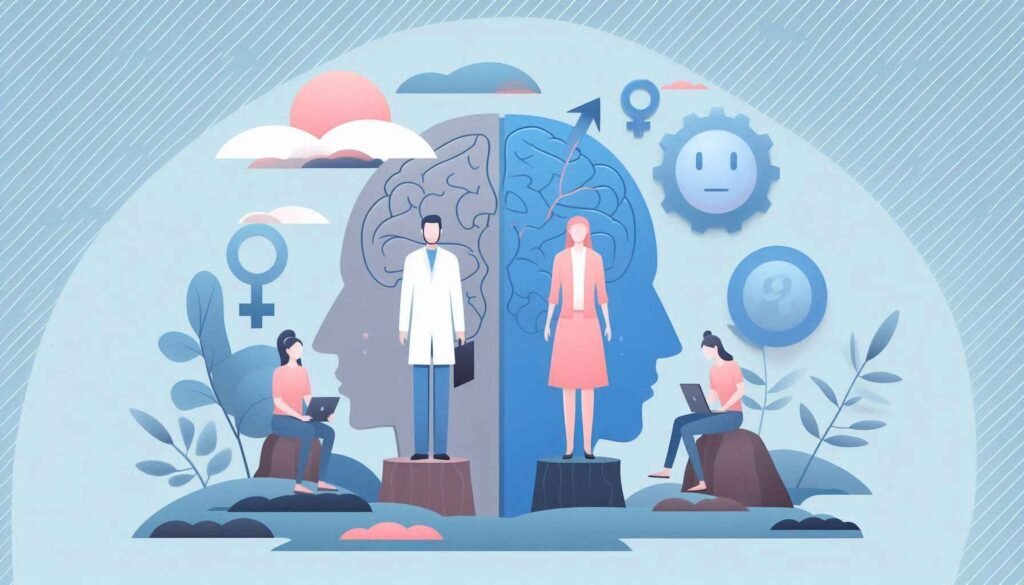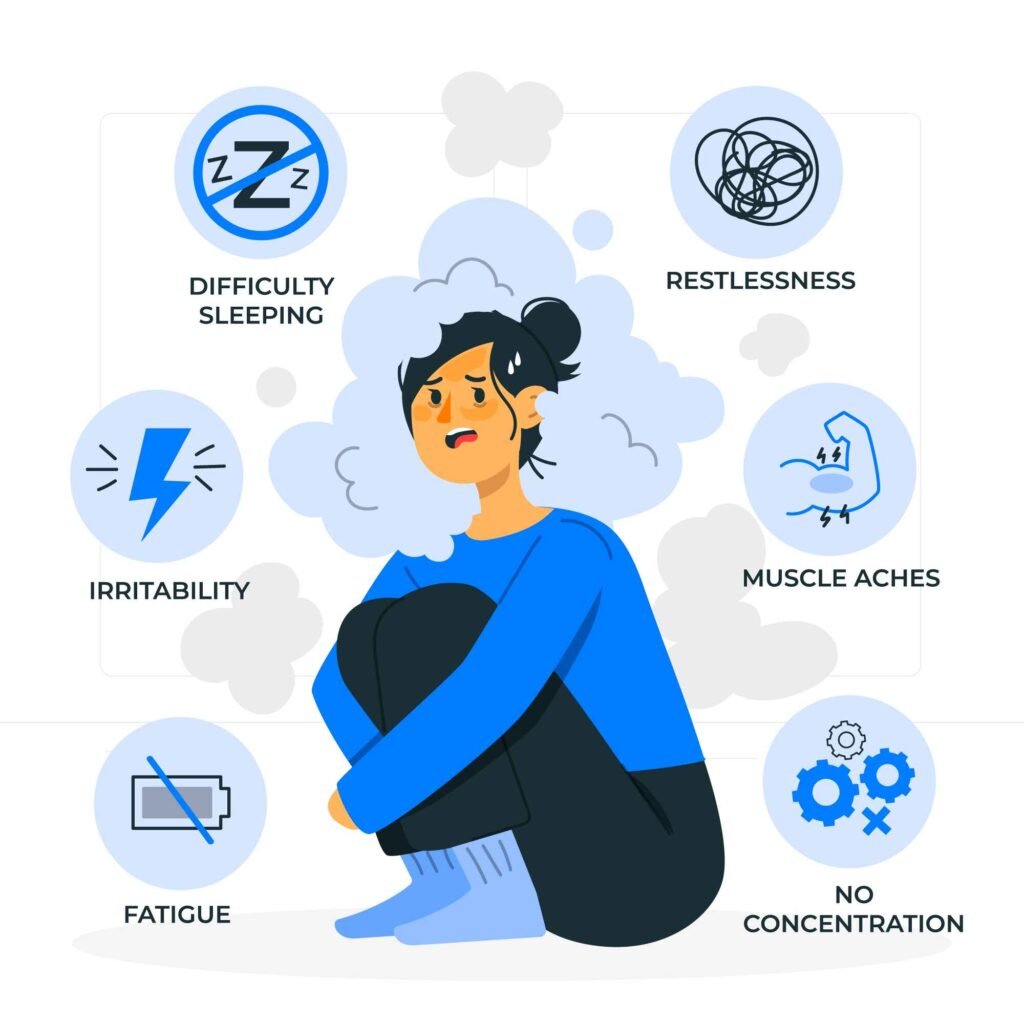
Why Understanding Gender Differences in Mental Health Matters
Mental health affects us all, but men, women, and nonbinary individuals experience mental health challenges differently. The reasons behind these differences are a mix of biology, culture, and societal expectations. Knowing these differences can help us provide better support for everyone.
- Targeted Keywords: gender differences in mental health, mental health challenges, understanding mental health by gender.
- Hook: “Did you know that women are almost twice as likely to experience anxiety compared to men, while men are at a higher risk of substance abuse? Let’s dive into why and how we can help.”
Section 1: Gender Gaps in Mental Wellbeing
Research has consistently shown that mental wellbeing varies significantly across genders. For instance, women have slightly lower mental wellbeing scores compared to men, whereas nonbinary individuals face much greater challenges. Recent studies found that nonbinary individuals are disproportionately affected by mental health issues, with more than 50% being clinically at risk for a mental health disorder(
Common Mental Health Issues in Different Genders:
- Women: Depression and anxiety are common, largely influenced by hormonal changes, caregiving roles, and societal pressures
- Men: Men are more likely to struggle with substance abuse and tend to report feelings of loneliness more intensely during their younger years
- Nonbinary Individuals: This group faces significant challenges due to a lack of societal acceptance and discrimination, contributing to higher rates of anxiety and depression
SEO Strategies: Use keywords such as “mental wellbeing by gender,” “common mental health issues in women,” and “mental health challenges for nonbinary individuals.”
Section 2: Challenges Faced by Women in Mental Health
Women tend to experience anxiety and depression more frequently than men. Why is that?
- Hormonal Factors: From puberty to menopause, hormonal shifts affect women’s emotional stability. During perimenopause, fluctuating hormone levels can lead to heightened risk of depression
- Life Circumstances: Many women juggle multiple roles—caregiver, breadwinner, and homemaker—which can lead to stress and burnout.
- Social Inequities: Women are more likely to live in poverty, leading to reduced access to healthcare and increased stress. Experiencing or surviving abuse is also a significant factor contributing to mental health issues in women.
Postpartum Depression: A Special Consideration
Postpartum depression affects approximately 10-15% of new mothers. The combination of hormonal changes, sleep deprivation, and the pressures of motherhood make this a uniquely challenging time for women(
SEO Keywords: women’s mental health challenges, depression in women, hormonal mental health issues, postpartum depression.
Section 3: Unique Mental Health Challenges for Men
Mental health in men often goes unspoken due to societal expectations about masculinity. Let’s break down the key challenges:
- Stigma Around Seeking Help: Men are less likely to talk about their feelings due to the stigma of appearing “weak.” This reluctance can lead to untreated anxiety and depression.
- Addiction and Substance Abuse: Men are more likely to turn to alcohol or drugs as a coping mechanism. Substance abuse issues often mask underlying mental health problems, making them harder to diagnose and treat.
- Loneliness and Isolation: Research suggests that men experience loneliness more acutely during their younger years, and it declines as they age. In contrast, women face greater loneliness later in life.
The Impact of Masculinity Norms
Masculinity norms often deter men from showing vulnerability. Campaigns promoting emotional openness among men can help break this barrier.
SEO Keywords: men’s mental health issues, substance abuse in men, mental health stigma among men.
Section 4: Mental Health Challenges for Nonbinary Individuals
Nonbinary and gender-diverse individuals face a unique set of challenges that significantly impact their mental health.
- High Rates of Anxiety and Depression: Nonbinary individuals face significantly higher rates of anxiety, depression, and suicidal ideation due to social rejection and discrimination
- COVID-19 and Mental Health: Studies have shown that nonbinary individuals faced the most significant decline in mental wellbeing during the pandemic, compared to men and women
- Lack of Access to Appropriate Care: Many healthcare providers lack training on gender diversity, leading to less effective mental health support.
SEO Keywords: mental health for nonbinary individuals, nonbinary mental health challenges, gender-diverse mental health issues.
Section 5: Solutions and Coping Strategies for Mental Health by Gender
Providing solutions to bridge the mental health gender gap requires both individualized approaches and broader societal changes.
1. Gender-Specific Mental Health Resources
- Women: Support networks for women in perimenopause or postpartum can be highly effective. Therapy focusing on hormonal changes and lifestyle adjustments can be beneficial.
- Men: Normalizing mental health care for men through public campaigns and providing anonymous mental health services can reduce stigma.
- Nonbinary Individuals: Offering inclusive and affirming mental health services is essential. Mental health practitioners should be trained to understand nonbinary experiences better.
2. Encouraging Emotional Expression Across Genders
- Breaking Societal Norms: Encouraging men and women to express emotions openly without fear of judgment will lead to healthier mental wellbeing. Campaigns like “It’s OK to Talk” have shown success in breaking down these barriers.
3. Community and Cultural Changes
Addressing broader social factors such as work overload, unequal pay, and societal pressure can help reduce mental health disparities. Employers, for example, can play a significant role by offering mental health days, flexible schedules, and resources for stress management.
4. Preventative Care and Early Intervention
- Preventive Programs: Implementing mental health education programs in schools and workplaces can help all genders understand how to manage stress and anxiety before they become unmanageable.
- Holistic Approaches: Activities like mindfulness, yoga, and exercise are shown to be beneficial across genders for improving overall mental health. Encouraging both men and women to engage in these activities can provide a non-stigmatized way to manage stress.
SEO Keywords: mental health coping strategies, gender-specific mental health resources, early intervention in mental health.
Conclusion: Moving Forward Together
Understanding the different ways men, women, and nonbinary individuals experience mental health challenges is crucial for providing effective support. By breaking down stigmas, promoting emotional openness, and offering gender-sensitive solutions, we can create a world where everyone has access to the care they need.
Remember, mental health is universal, but the challenges and solutions are not one-size-fits-all. Let’s support each other by acknowledging our differences and working together towards a mentally healthier society.



